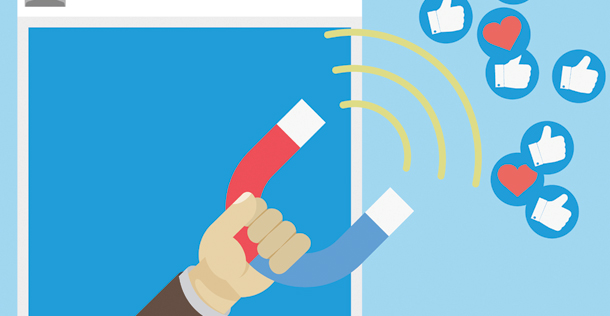Following revelations that Facebook sold private data to third-party app developers earlier this year, #deletefacebook became a thing and, for the first time ever, more daily U.S. users were quitting than joining. I found this amusing, since I had quit over a year ago. I didn’t quit because I objected to Mark Zuckerberg’s siphoning off personal data. That didn’t surprise me in the least. How else did people think Facebook became a $500 billion company? I quit for entirely personal reasons.
I had become addicted.
I like to think of myself as a successful humor columnist. And I used to earn a modest living selling my work to name-brand magazines. Then the editors I had cultivated over the years started getting replaced by humans born when some of my current undergarments were manufactured. These millennials had their own favorite writers from websites with ultra-trendy if nonsensical names like Boing Boing, Gizmodo, TorrentFreak. I was getting a lot more rejections than acceptances. Then even the rejections stopped.
But it didn’t depress me. Because when I powered up the computer every day to see nothing of interest in incoming email, I could cheer myself up by clicking on Facebook. Because among the 10 billion or however many Facebook members existed somewhere in the world, there were always a few who remembered my writing — people I could count on to “like” posts daring to reminisce about the Monkees and Monty Python movies. These were sweet people just as dismayed by what was happening to mainstream media and popular culture as I was. Sometimes, more than 300 people engaged with my posts. This was validation: I was still a successful writer.
My audience was out there. I could see their “likes” and “loves” and “LOLs.” But in reality, they were people who read what I wrote just because I happened to be the best thing — or the first thing — on their Facebook newsfeed at that moment. And they didn’t have to pay me a cent to read it. I had unwittingly become a full-fledged member of the Facebook sales force, helping to sell ad space with my copy and getting paid nothing in return.
Yet I hadn’t noticed because Facebook’s developers are paid well to maximize its addictive value. The social network is exquisitely designed to keep its users chained to the screen and involved as long as psychologically possible — and longer — to give each of us the perfectly tailored fantasy of staying completely in touch with the current events and the people we want to know about in the precise way we want to know about them.
Facebook can be anything we feel is lacking in our own personal lives. To conservatives, it’s the Rosetta Stone for translating liberal distortions of the truth. To liberals, it’s for clearing up the conservative distortions. To insurance salesmen, it’s a cocktail party where people are fascinated by their sales pitches.
I was in the bubble like so many others. Then one day, I was on the beach with my 6-year-old daughter, staring at my phone instead of watching her. I was reading half-baked opinions about Donald Trump by some guy I met on vacation in 2008. And I missed her first-ever handstand. The infuriating reality of how I was wasting my time hit me in a flash. I was liberated.
Well, not yet. I still had some major detoxing to do. Saying goodbye on Facebook isn’t easy.
I was shocked by how many Facebook friends begged me not to quit when I announced I would. Many were people I’d never heard from before. Some were familiar names I had “friended” because I respected their work but had no idea they ever saw my stuff until they told me how much my posts meant to them.
Many of them seemed equally addicted to the Facebook experience. And they didn’t want to lose a fellow addict. “But what about the networking value?!” one guy asked. Networking is one of the very powerful lures of Facebook. But in reality, nothing amazingly good ever came out of my Facebook decade. It never landed me a real job, or a book contract, or even a single freelance assignment. It only seemed like it always would — not unlike the elusive jackpot you always imagine with every slot pull. A ton of useless “U da man!”s was my biggest payout.
To some “friends,” it was as if I had posted a suicide note and was leaning out of my high-rise bedroom window. To me, it was more like being in a crack den and theirs were voices trying to convince me that cleaning up and leaving was a bad idea.
But I jumped. I deactivated my account and deleted my phone app. And the timing couldn’t have been better because I had previously made plans that same weekend to visit a cabin up in the woods with no cell service owned by a buddy who had never joined Facebook. “Why do you need to be validated to be happy?” he asked when I described my separation anxiety. “Why is it so important to your self-identity for strangers to read your words and laugh? Isn’t it more important to be a present father than a popular writer?”
The first 24 hours of any addiction withdrawal is always the worst. Every time something funny happened, I died inside not sharing it.
But I was off the grid. Even if I hadn’t deactivated Facebook, I wouldn’t have been able to access it. And as the weekend wore on, Facebook detox turned into rehabilitation as we played guitar, drank Coors Light, and watched North By Northwest with our families.
A week later, not using Facebook felt as natural as being abused by it had been. Two weeks in, I started seeing some major improvements in my life.
Instead of learning what my former college roommate eats for breakfast, I walked my daughter to school without once checking my phone. Instead of “aww”-ing at a former co-worker’s puppy climbing stairs, I admired how beautiful my wife looked in real life.
Every now and then, I’d get a text or email from someone only just noticing my absence, someone asking “how do I get in touch with you?” without realizing that they just had. (One sent a message to my wife, worried that I had died.)
There was a brief Facebook backlash to my exit, but it was a sarcastic one that made me laugh. A childhood friend started a group called “We Never Liked Corey Anyway,” adding my wife to the group to be sure I’d know about it.
My favorite post in that group was: “Can you imagine how huge of an ego boost this group would be to him?!”
It actually was, and that’s part of why I belong in real life, not on Facebook.
Since writing this piece, the author has found a full-time job that requires his presence on Facebook. He swears he spends no more than an hour a day on the site, and it’s all strictly business.
This article is featured in the July/August 2018 issue of The Saturday Evening Post. Subscribe to the magazine for more art, inspiring stories, fiction, humor, and features from our archives.
Become a Saturday Evening Post member and enjoy unlimited access. Subscribe now




Comments
I never hooked up to Facebook, although it can serve a valid purpose, if used for such. However, much of social media is what used to be known as gossip. (Note that is a word you don’t hear anymore), but is still as destructive.
I wrote a well thought out comment here last month… Why has my comment been deleted?
congrats on your new job
I’m sure saying goodbye on Facebook isn’t easy Corey, which is one reason I never said hello to it in the first place. Paul Umbstead, I agree with you, and you’re a winner for having quit it.
Ann, I can see the value it has for you and is actually useful here. Bob Taylor, I agree with your points a lot. If not having completely trashed the word ‘friend’ it’s given it a weird second meaning that makes you think twice when hearing it.
Congratulations to you Bob, for having quit Facebook two years ago like Paul did. As for me personally, the whole thing gives me the creeps. For those that like (another ruined word) it though, by all means, do as you see fit with it.
Facebook is evil, not just because it is an addictive timewaster, but because it has trashed the lovely word, “friend.” It was ridiculously easy for me to quit two years ago.
I admit, I too, have felt addicted and threatened to cut the chord! There are
other interests I’d like to spend time on. However, when you are up in years and more or less housebound, it can be a lifesaver. For me, it’s a shot in the arm to see and hear from our daughters, grandchildren, great-grandchildren, as
well as long-distance cousins, old neighbors, and friends. I might, however, consider giving it up for Lent and seeing how I survive!
I quit “Facebook” about 2 years ago the same way I quit smoking after 37 years. It is useless and habituating, pure waste of valuable time. Quit while you can.